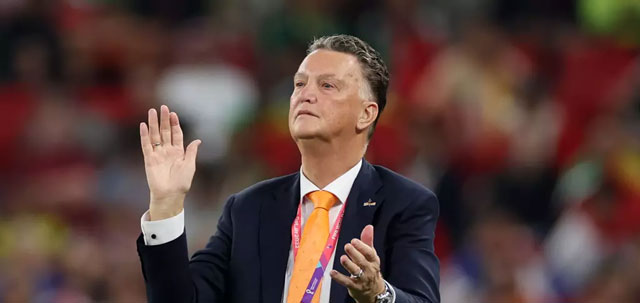







Louis van Gaal’s team have banished their Russia 2018 disappointment with a rebirth at Qatar 2022.
Doha, Qatar | FIFA.COM | It is 20 years since Louis van Gaal’s first stint as Netherlands coach ended in failure to qualify for the 2002 FIFA World Cup Korea/Japan. How appropriate that the high priest of Dutch football is overseeing the national team’s latest rebirth.
Van Gaal is a domestic title winner in three countries and the man who made Ajax relevant again at the pointy end of European football, masterminding the club’s 1995 UEFA Champions League triumph. But even this wise old owl wasn’t immune from the Netherlands’ established bust-then-boom pattern.
Indeed, Van Gaal was in charge when the most recent cycle neared the end of its spin with defeat by Argentina in the semi-finals of Brazil 2014. The Dutch would slumber in qualifying for the World Cup four years later, but one of the most iconic national teams of them all is wide awake in Qatar and preparing for an attractive last-16 encounter with Gregg Berhalter’s dashing young USA side on Saturday.
Van Gaal owns an intriguing personality, brimming with contradictions: single-minded and open to change, bullish and humble, crotchety and endearingly mischievous.
The Netherlands team that convincingly topped Group A – more on that later – is founded on the resilience and knowhow of Virgil van Dijk, Davy Klaassen, Daley Blind and, increasingly, Memphis Depay, and lent its thrust and adventure by Denzel Dumfries, Frenkie de Jong and livewire 23-year-old forward Cody Gakpo, whose three group goals were scored variously with head and left foot and right foot.
Dumfires, De Jong, Blind and Matthijs de Ligt were the only survivors from a pallid last-16 defeat by Czech Republic at last year’s UEFA Euro to begin the Netherlands’ opening game in Qatar, a 2-0 victory over Senegal.
Such an overhaul – of both personnel and fortunes – is a recognisable tale in the nation that gifted us ‘Total Football’. For a generation of supporters across the planet, it remains a crying shame the teams of Cruyff, Rep, Neeksens, Rensenbrink, Haan and Krol – no forenames required – couldn’t win finals against hosts West Germany and Argentina, in 1974 and 1978, respectively.
#NED are on to the Round of 16!#FIFAWorldCup | #Qatar2022
— FIFA World Cup (@FIFAWorldCup) November 29, 2022
A curious thing happened following those vivid tournaments, recalled as readily for the intricate, pioneering beauty of the runners-up, as the identity of the winners. The Netherlands all but disappeared, unsighted at a major tournament for eight years following the UEFA EURO 1980.
They re-emerged, not so much blinking into the light, as roaring back into the world’s glare. A cadre of buccannering players – Gullit, Van Basten, Rijkaard, Koeman and Co – won the country’s only major trophy at EURO 1988. Their World Cup in Italy two years later went south in a prickly Round of 16 defeat by West Germany.
Notice the theme? Three World Cups – other than fleeting participations in 1934 and 1938 – and three defeats by the eventual winners. Make that four: Brazil overcame the Netherlands 3-2 in a quarter-final en route to the 1994 title. The Dutch, however, had rediscovered their mojo and four years later went one better, only to run into Brazil, once more, and lose the semi-final on penalties. As an aside, the Netherlands initial penalty shootout efforts made England look like sharp shooters.
It was, perhaps, inevitable, if we employ history as a gauge, that the Netherlands would miss out on the 2002 World Cup after making significant headway in successive tournaments.
Qualification for 2006 was achieved at a canter under Van Basten, hired to provide both guidance and wow factor for a team packed with speed and invention, but a one-goal defeat by Portugal in the last-16 remains the lone instance of Dutch World Cup hopes expiring at the hands of a team that didn’t progress to the final.
The ball was rolling again, nevertheless. Andres Iniesta’s extra-time strike separated the Dutch from a World Cup triumph in 2010. At Brazil 2014, with Van Gaal in his second spell as coach and mining a succession of efficient performances from a squad that tended towards the prosaic, the Netherlands were revisited by their penalty hex in the last-four meeting with Argentina. That disappointment once and for all extinguished the World Cup aspirations of Wesley Sneijder, Arjen Robben and Robin van Persie, the gifted trio who shouldered the bulk of the creative and goalscoring burden at three straight tournaments.
The failure to reach Russia, coupled with the European low against the Czechs, ushered in this new era, which looks startlingly familiar for reasons beyond the old stager at the helm.
They were in a sticky spot back then, but the Netherlands’ bouncebackability, to use a comparatively recent entry into the sport’s lexicon, is without question. Sure, it would require a mighty spring to draw a line under their eight-year World Cup exile in the grandest style. But we need only consult the history books to appreciate Van Gaal’s team will take some stopping. If any opponent manages it, you’d like their chances of a Lusail Stadium date on 18 December.
*****
SOURCE: FIFA.COM
 The Independent Uganda: You get the Truth we Pay the Price
The Independent Uganda: You get the Truth we Pay the Price




